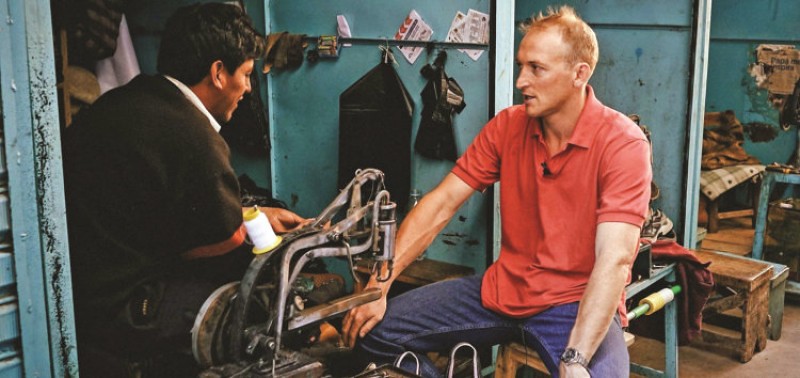Jonny speaks up for Jesus in Bolivia
By Tim Allan | Bolivia in South America

Pioneering mission comes in all shapes and sizes — just ask Jonny Anderson, who has spent the last three years learning the South American language Quechua.
SIM started by taking the gospel to those who had never heard it, but a key part of today’s strategy is helping those who have met Jesus become good disciples. Jonny, sent out from the UK, knows there is a desperate need for Quechua churches to hear Christ-centred preaching in their own language.
Two million Bolivians have Quechua as their first language," he said. "To explain the gospel, you really need to do it Quechua.”
Jonny now lives in Sucre, Bolivia, with wife, Olga, and two of their three children: seven-year-old Joanna and six-year-old Jonah. Their nine-year-old son Joel is at boarding school in England, close to Jonny’s parents in Somerset.
Near Jonny’s home in Sucre stands a small Quechua church. Most of the 50 or so adult members are aged around 30, with a slightly older leadership. Several people have recently been baptised, but the continuing challenge is to ensure they are well-discipled.
Jonny said: “If you teach or preach in Spanish, you are using the language of the education system, so people feel they are being taught rather than discipled. But the gospel is all about relationship with Jesus. By using the Quechua heart language, I can emphasise that and it is easier to show Christ is part of everyday life, rather than just for Sunday; and that Christ is for everyone, not just those with special knowledge.”
Jonny ‘s two key preaching techniques are the narrative sermon and the white board with stick men.
In the sermon, Jonny goes through a Bible story and then applies it to the lives of those in the congregation. He also encourages others to give their testimony and helps them understand how Jesus met people like them (rich man, poor man, ill person, and more).
By using a white board and stick men, he can go through a Bible story visually, which is especially effective in a primarily oral culture.
Jonny, who has just started preaching in Quechua, said: “The big challenge is to put Christ at the centre of the Quechua church, so that people understand the need to repent and find forgiveness.”
To do that effectively, Jonny knows he needs to improve his Quechua still further — and longs for other people to join him in the work. "After three years of learning the language, I’m just about able to preach in church but it is still tough. I’d say I was a beginner in the advanced class. But if God is really calling you, he will enable you to get through the language-learning and you’ll be motivated.”
Do you love learning new languages? Is your heart set on discipling God's people to become strong, well-grounded disciples of Christ who will go out and lead people to Him? If so, SIM may have a place for you. Contact us today!
Related stories

Uruguay immigrants are putting down New Roots Duplicate 1
Uruguay has a large immigrant population, and students from the vocational programme at the Biblical Seminary of Uruguay, a partner of SIM, realised many foreigners were finding it difficult to adjust to their new home. New Roots ministry was formed to assist these newcomers!

Uruguay immigrants are putting down New Roots
Uruguay has a large immigrant population, and students from the vocational programme at the Biblical Seminary of Uruguay, a partner of SIM, realised many foreigners were finding it difficult to adjust to their new home. New Roots ministry was formed to assist these newcomers!

New Uruguay mission school has vision for world missions
SIM has a commitment to see Uruguay reached for Christ. And through key partnerships with like-minded organisations, a new missionary training school called Todos Oiran (All Will Hear) is opening its doors in Montevideo, Uruguay.

